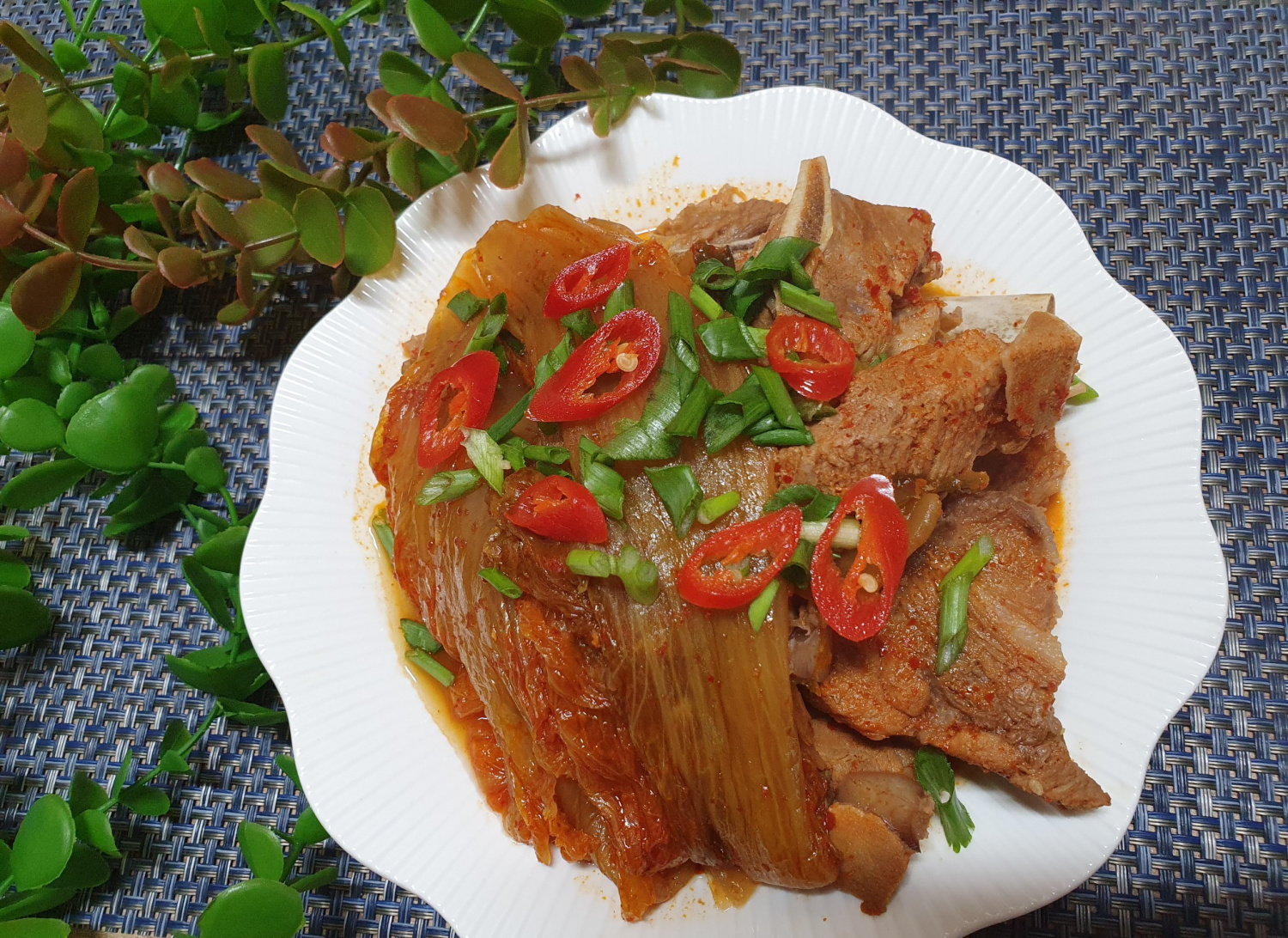Slow-Cooked Pork Rib Kimchi Stew
Hearty Pork Rib Kimchi Stew Made with Aged Kimchi

The weather is so cold today, staying below freezing! I prepared a warm and spicy stew for dinner. Kimchi and pork are a match made in heaven, so any cut of pork works wonderfully in kimchi stew. This time, I slow-cooked pork ribs and added aged kimchi to make kimchi stew, and it turned out incredibly delicious. The combination of tender pork ribs and flavorful aged kimchi creates a deep, comforting taste that’s perfect for a chilly day. Enjoy this rich and satisfying stew!
Ingredients- Pork ribs 600g
- Aged kimchi (whole head) 1/2 head
- Onion 1/2
- Minced garlic 2 Tbsp
- Doenjang (soybean paste) 1 Tbsp
- Cheongyang chili peppers 3
- Sugar 2 Tbsp
- Cooking wine (Mirin or Cheongju) as needed
- Kimchi brine 3 ladles
- Kelp stock (or rice water) enough to cover
Cooking Instructions
Step 1
Rinse the pork ribs thoroughly under cold running water and soak them for about 30 minutes to remove any residual blood. Properly draining the blood is crucial for a clean and delicious kimchi stew without any gamey odors.

Step 2
To further remove impurities and any lingering odors, blanch the pork ribs. Bring a pot of water to a boil, add 1 tablespoon of doenjang, and simmer the ribs for about 3-5 minutes, just until the impurities rise to the surface as foam. Avoid overcooking at this stage; the goal is to draw out the impurities.

Step 3
Drain the blanched ribs and rinse them again under cold running water. Place the cleaned pork ribs at the bottom of a heavy-bottomed pot. This layering helps prevent the kimchi from sticking to the bottom and ensures even cooking.

Step 4
Arrange the aged kimchi (half a head, roughly cut if large) on top of the pork ribs. The tangy and deep flavors of the aged kimchi will meld beautifully with the pork.

Step 5
Pour in enough kelp stock (or rice water) to generously cover the ingredients. Add the chopped onion, sliced Cheongyang peppers, minced garlic (2 Tbsp), chili powder (optional, adjust based on kimchi’s spice level), sugar (2 Tbsp), and cooking wine. Bring the stew to a boil over high heat, then reduce the heat to medium-low, cover the pot, and let it simmer gently for at least 40 minutes, or until the pork ribs are fork-tender and the flavors have melded beautifully. Slow cooking is key here for maximum tenderness and flavor infusion.

Step 6
Once the stew has thickened and the pork is tender, taste it. The aged kimchi usually provides enough saltiness and flavor, but if you find it needs a little more, you can season with salt or soy sauce to your preference. The rich umami from the kimchi and pork is truly satisfying.

Step 7
Tear off a piece of the tender, well-cooked kimchi and enjoy it with a bite of the succulent pork rib. This is the taste, this is the feeling – pure comfort food!

Step 8
Your delicious Slow-Cooked Pork Rib Kimchi Stew is ready! This hearty and flavorful dish, simmered for a long time to achieve perfect tenderness and a delightful spicy kick, will make your dinner table wonderfully complete. Wishing everyone good health and a delicious meal!^^



